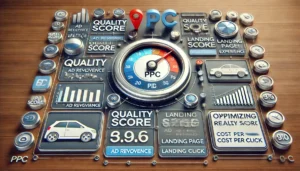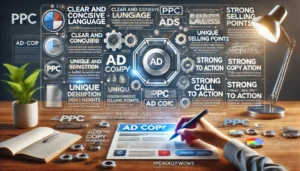Does PPC Really Work? PPC Myths Debunked

Does PPC Really Work? Pay-per-click (PPC) advertising is often misunderstood, leading to many myths that can misguide businesses. This article aims to clarify what PPC really is, how it operates, and its true value for businesses of all sizes. By debunking common misconceptions, we hope to shed light on the effectiveness of PPC and its role in digital marketing.
Key Takeaways
- PPC is not just for big companies; small businesses can also benefit significantly.
- Setting a budget for PPC allows for better control of advertising costs.
- Quality Score plays a crucial role in determining ad placement and cost.
- PPC requires ongoing management and optimisation, not a ‘set-and-forget’ approach.
- Combining PPC with SEO strategies can enhance overall marketing effectiveness.
Does PPC Really Work? Understanding the Basics of PPC
What is PPC?
PPC, or Pay-Per-Click, is a form of online advertising where businesses pay a fee each time their ad is clicked. This means you only pay when someone shows interest in your ad. It’s a way to buy visits to your site rather than earning them organically.
How Does PPC Work?
PPC works through a bidding system. Advertisers bid on keywords relevant to their business. When users search for those keywords, ads may appear. The position of the ad depends on the bid amount and the ad’s quality score. Here’s a simple breakdown:
- Choose Keywords: Identify relevant keywords for your business.
- Set a Budget: Decide how much you want to spend daily or monthly.
- Create Ads: Write compelling ads that attract clicks.
- Monitor Performance: Regularly check how your ads are doing and adjust as needed.
Why Businesses Use PPC
Businesses use PPC for several reasons:
- Immediate Results: Unlike SEO, which can take time, PPC can drive traffic quickly.
- Targeted Advertising: You can target specific demographics, locations, and interests.
- Control Over Budget: You can set limits on how much you spend.
In the world of digital marketing, PPC is a powerful tool that can help businesses reach their goals faster.
By understanding these basics, we can better appreciate how PPC fits into the larger marketing landscape. It’s not just about spending money; it’s about making smart investments that yield results.
Does PPC Really Work? Common Misconceptions About PPC
PPC is Too Expensive
Many people believe that PPC advertising is prohibitively expensive. However, this isn’t entirely true. With platforms like Google Ads, we can set daily and monthly budgets, allowing us to control our spending effectively. If we manage our budgets wisely, PPC can actually be a cost-effective strategy. Here are some points to consider:
- We can adjust our budgets based on performance.
- PPC can generate leads that exceed our investment.
- It’s essential to focus on ROI rather than just costs.
PPC Doesn’t Drive Conversions (Does PPC Really Work?)
Another common myth is that PPC doesn’t lead to conversions. This is misleading. In reality, PPC can be a powerful tool for driving sales and leads. We must ensure that our ads are targeted correctly and that we track conversions effectively. A well-structured PPC campaign can significantly boost our conversion rates.
Only Big Businesses Benefit from PPC
Some believe that only large companies can take advantage of PPC. This is simply not the case. Small and medium-sized businesses can also thrive with PPC. By targeting specific audiences and using effective keywords, even smaller companies can achieve great results.
PPC is not just for the big players; it’s a versatile tool that can benefit businesses of all sizes.
In summary, understanding these misconceptions helps us leverage PPC more effectively. By debunking these myths, we can create more successful campaigns and maximise our advertising efforts.
| Myth | Reality |
|---|---|
| PPC is too expensive | It can be cost-effective with proper management |
| PPC doesn’t drive conversions | It can significantly boost sales and leads |
| Only big businesses benefit | Small businesses can also thrive with targeted strategies |
Does PPC Really Work? The Relationship Between PPC and SEO
Can PPC and SEO Work Together?
In our experience, PPC and SEO are not mutually exclusive; they can actually complement each other quite well. By using both strategies, we can attract a wider audience. PPC can provide immediate visibility, while SEO builds long-term organic traffic. This combination allows us to maximise our reach and effectiveness.
Impact of PPC on Organic Rankings (Does PPC Really Work?)
Interestingly, PPC can influence our organic rankings. When we run PPC campaigns, we often see an increase in organic traffic. This is because paid ads can boost brand awareness, leading to more searches for our brand. Additionally, a well-structured PPC campaign can help us identify high-performing keywords that we can then target in our SEO efforts.
Balancing PPC and SEO Strategies
To achieve the best results, we need to balance our PPC and SEO strategies. Here are some key points to consider:
- Keyword Research: Use insights from PPC campaigns to inform our SEO keyword strategy.
- Content Creation: Create content that addresses the needs identified through both PPC and SEO data.
- Performance Monitoring: Regularly analyse the performance of both strategies to ensure they are working in harmony.
By integrating PPC and SEO, we can create a more robust marketing strategy that drives both immediate and long-term results.
In conclusion, understanding the relationship between PPC and SEO is crucial for any business looking to enhance its online presence. By leveraging both, we can achieve greater success in our marketing efforts.
Does PPC Really Work? Cost-Effectiveness of PPC Campaigns
Setting a Budget for PPC
When we think about PPC management, the first step is to set a budget. This helps us control our spending and avoid overspending. Here are some key points to consider:
- Daily and monthly limits: Most platforms allow us to set these limits.
- Adjust as needed: We can change our budget based on performance.
- Track spending: Regularly check our expenses to ensure we stay within budget.
Maximising ROI with PPC (Does PPC Really Work?)
To truly benefit from PPC, we must focus on maximising our return on investment (ROI). If our PPC campaigns generate more revenue than we spend, they become cost-effective. Here’s how we can achieve this:
- Target the right audience: Use data to identify who is most likely to convert.
- Optimise ad copy: Craft compelling ads that attract clicks.
- Regularly review performance: Conduct a PPC audit to identify areas for improvement.
Affordable PPC Strategies
PPC doesn’t have to break the bank. Here are some affordable strategies we can implement:
- Start small: Begin with a modest budget and scale up as we see results.
- Use long-tail keywords: These often have lower competition and cost.
- Consider a London PPC agency: They can provide expertise without high costs.
By understanding the cost-effectiveness of PPC, we can make informed decisions that lead to better results.
In conclusion, PPC can be a powerful tool for businesses of all sizes. With the right strategies, we can ensure that our campaigns are not only effective but also affordable. Let’s embrace the potential of PPC and watch our businesses grow!
Does PPC Really Work? The Importance of Quality Score in PPC
What is Quality Score?
Quality Score is a crucial metric in PPC advertising. It reflects how relevant your ads, keywords, and landing pages are to users. A higher Quality Score can lead to better ad placements and lower costs per click. Understanding this score is essential for optimising our campaigns.
Factors Affecting Quality Score (Does PPC Really Work?)
Several factors influence Quality Score:
- Ad relevance: How closely your ad matches the user’s search intent.
- Landing page experience: The quality and relevance of the landing page.
- Expected click-through rate (CTR): The likelihood that users will click on your ad.
Improving Your Quality Score
To enhance our Quality Score, we can take the following steps:
- Refine keywords: Use specific and relevant keywords.
- Enhance ad copy: Create compelling and relevant ad text.
- Optimise landing pages: Ensure landing pages are user-friendly and relevant to the ad.
By focusing on Quality Score, we can significantly improve our PPC performance and reduce costs.
In conclusion, Quality Score is not just a number; it’s a vital part of our PPC strategy. By understanding and improving it, we can achieve better results and maximise our advertising budget. Remember, a higher Quality Score means more effective ads and a better return on investment.
Additionally, we should always keep in mind that effective PPC campaigns require ongoing attention and adjustment. This ensures we stay competitive and relevant in our advertising efforts.
Does PPC Really Work? Targeting the Right Audience with PPC
Identifying Your Target Audience
To make our PPC campaigns effective, we must first identify our target audience. This involves understanding who they are, what they need, and how they behave online. Here are some steps we can take:
- Conduct market research to gather data on potential customers.
- Create buyer personas to represent different segments of our audience.
- Use tools like Google Analytics to track user behaviour on our website.
Using Keywords Effectively (Does PPC Really Work?)
Once we know our audience, we can use keywords to reach them. Keywords are the terms our potential customers type into search engines. Here’s how we can use them:
- Research relevant keywords that align with our products or services.
- Use long-tail keywords to target specific queries.
- Regularly update our keyword list based on performance data.
Geo-Targeting in PPC Campaigns
Geo-targeting allows us to show ads to users in specific locations. This is particularly useful for local businesses. We can:
- Set up campaigns that target specific cities or regions.
- Adjust bids based on location performance.
- Use location-based keywords to attract local customers.
By focusing on the right audience, we can significantly improve our PPC results. Targeting effectively leads to better conversions and a higher return on investment.
In conclusion, targeting the right audience is crucial for PPC success. By identifying our audience, using keywords wisely, and implementing geo-targeting, we can enhance our campaigns and achieve our marketing goals. Remember, a well-targeted ad is more likely to convert, making our efforts worthwhile.
For a more tailored approach, consider a landing page review to assess your PPC ads performance and ensure they resonate with your audience.
Does PPC Really Work? The Role of Ad Copy in PPC Success
Crafting Compelling Ad Copy
Creating effective ad copy is crucial for the success of our PPC campaigns. The right words can make all the difference. We need to focus on clarity, relevance, and a strong call to action. Here are some key points to consider:
- Use clear and concise language.
- Highlight unique selling points.
- Include a strong call to action.
A/B Testing Ad Copy (Does PPC Really Work?)
To ensure our ads perform at their best, we should regularly conduct A/B tests. This involves creating two versions of an ad and comparing their performance. By doing this, we can identify which elements resonate more with our audience. Here’s a simple process:
- Create two versions of the ad.
- Run them simultaneously.
- Measure the results and adjust accordingly.
Common Mistakes in Ad Copy
Even seasoned marketers can make mistakes in ad copy. We must be aware of these pitfalls to avoid wasting our budget:
- Overloading with information.
- Ignoring the target audience.
- Failing to include a call to action.
In PPC, our ad copy is often the first impression we make on potential customers. It’s essential to get it right to drive engagement and conversions.
By focusing on these aspects, we can significantly improve our PPC success. Remember, the words we choose matter. They can either attract or repel potential customers, so let’s make them count!
Does PPC Really Work? Debunking the Myth: PPC is a Set-It-and-Forget-It Strategy
The Need for Continuous Optimisation
Many people believe that once a PPC campaign is set up, it can run on autopilot. This is a dangerous misconception. In reality, PPC requires ongoing attention and adjustments. We must regularly review our campaigns to ensure they are performing well. This includes:
- Monitoring click-through rates (CTR)
- Adjusting bids based on performance
- Testing new ad copy and keywords
Monitoring PPC Performance (Does PPC Really Work?)
To truly succeed with PPC, we need to keep a close eye on our performance metrics. This means checking:
- Conversion rates
- Cost per acquisition (CPA)
- Return on investment (ROI)
By analysing these metrics, we can identify what’s working and what isn’t. If we neglect this step, we risk wasting our budget on ineffective ads.
Adapting to Market Changes
The digital landscape is always changing. New competitors emerge, and consumer behaviour shifts. Therefore, we must be flexible. Regularly updating our strategies is crucial. We should:
- Stay informed about industry trends
- Adjust our targeting based on audience insights
- Experiment with different ad formats
In the world of PPC, staying proactive is key. We can’t afford to be complacent if we want to achieve the best results.
In conclusion, PPC is not a set-it-and-forget-it strategy. It demands our attention and effort to truly thrive. By continuously optimising our campaigns, monitoring performance, and adapting to changes, we can maximise our advertising effectiveness. Remember, as highlighted in recent PPC news, reviewing ad performance is essential for success.
Does PPC Really Work? Measuring the Success of Your PPC Campaigns
Key Metrics to Track
To truly understand how well our PPC campaigns are performing, we need to focus on several key metrics. These include:
- Click-Through Rate (CTR): This shows how many people clicked on our ad compared to how many saw it.
- Conversion Rate: This tells us how many of those clicks resulted in a desired action, like a purchase.
- Cost Per Acquisition (CPA): This metric helps us understand how much we are spending to gain a customer.
Using Analytics Tools (Does PPC Really Work?)
Utilising tools like Google Analytics can provide us with valuable insights. We can track our campaigns effectively and see which ads are performing best. Here’s a simple table to illustrate:
| Metric | Description |
|---|---|
| Click-Through Rate | Percentage of clicks on ads |
| Conversion Rate | Percentage of clicks that convert |
| Cost Per Acquisition | Average cost to acquire a customer |
Interpreting PPC Data
Understanding the data we gather is crucial. We should regularly review our metrics to:
- Identify trends in our campaigns.
- Adjust our strategies based on performance.
- Ensure we are meeting our business goals.
Regularly reviewing our PPC performance helps us stay on track and make necessary adjustments. A Google Ads audit can be a great way to evaluate our ad performance and identify areas for improvement.
By focusing on these aspects, we can measure the success of our PPC campaigns effectively and make informed decisions moving forward.
Does PPC Really Work? PPC for Different Business Sizes
PPC for Small Businesses
For small businesses, PPC can be a game changer. It allows us to compete with larger companies without needing a massive budget. Starting with a modest budget can help us test the waters. Here are some strategies:
- Focus on local keywords to attract nearby customers.
- Use ad extensions to provide more information.
- Monitor performance closely to adjust campaigns as needed.
PPC for Medium-Sized Enterprises (Does PPC Really Work?)
Medium-sized businesses often have more resources to invest in PPC. This means we can explore a wider range of keywords and platforms. A few tips include:
- Diversifying ad spend across multiple channels.
- Implementing retargeting strategies to re-engage visitors.
- Analysing competitors to find gaps in their strategies.
PPC for Large Corporations
For large corporations, PPC is about maximising reach and efficiency. We can leverage extensive data to refine our campaigns. Here’s how:
- Use advanced targeting options to reach specific demographics.
- Invest in A/B testing to optimise ad performance.
- Regularly review analytics to ensure campaigns align with business goals.
In conclusion, regardless of size, every business can benefit from a well-structured PPC strategy. By understanding our unique needs and goals, we can tailor our approach to achieve the best results.
In summary, PPC is not just for the big players. It’s a versatile tool that can help businesses of all sizes thrive in a competitive market. Let’s embrace it!
The Future of PPC Advertising
Emerging Trends in PPC
As we look ahead, the landscape of PPC is evolving rapidly. New technologies and strategies are reshaping how we approach advertising. Here are some trends to watch:
- Increased automation: Tools are becoming smarter, allowing for more efficient campaign management.
- AI integration: Artificial intelligence is helping us optimise ads and target audiences more effectively.
- Voice search: With the rise of smart speakers, we need to adapt our keywords and strategies.
The Role of AI in PPC (Does PPC Really Work?)
Artificial intelligence is not just a buzzword; it’s a game changer. AI can analyse vast amounts of data quickly, helping us make informed decisions. For instance, it can identify which ads perform best and suggest adjustments. This means we can focus on strategy rather than getting lost in data.
Preparing for Future Changes in PPC
To stay ahead, we must be proactive. Here are some steps we can take:
- Stay informed: Regularly update ourselves on PPC trends and changes in platforms like Google Ads.
- Experiment with new formats: Try out different ad types to see what resonates with our audience.
- Invest in training: Ensure our team is skilled in the latest PPC tools and techniques.
The future of PPC is bright, but it requires us to adapt and innovate continuously. By embracing change, we can unlock new opportunities for growth.
In conclusion, as we navigate the future of PPC, we must remember that flexibility and knowledge are key. By leveraging emerging trends and technologies, we can enhance our campaigns and drive better results for our clients, whether we are a PPC ecommerce agency or a Google ads PPC specialist.
Let’s not forget the importance of understanding conversion attribution models. They are crucial for optimising our PPC campaigns and ensuring we measure performance accurately.
With the right strategies in place, we can ensure that our PPC efforts are not just effective but also sustainable in the long run.
As we look ahead, the world of PPC advertising is set to evolve rapidly. With new technologies and strategies emerging, businesses must stay ahead of the curve to maximise their online presence. If you’re ready to enhance your advertising efforts, visit our website for a free review of your ads performance today!
Conclusion
In summary, the myths surrounding PPC advertising can often cloud our understanding of its true value. Many believe that PPC is either too expensive or ineffective, but this is simply not the case. When managed correctly, PPC can be a powerful tool for driving traffic and generating sales. It’s essential to view PPC as a complementary strategy alongside SEO, rather than a replacement. By debunking these myths, businesses can make informed decisions and harness the full potential of their advertising efforts. Remember, the key to success lies in continuous monitoring and optimisation of your campaigns.
Frequently Asked Questions
What does PPC stand for?
PPC stands for Pay-Per-Click, which is an online advertising model where advertisers pay each time someone clicks on their ad.
How does PPC work?
In PPC, advertisers bid on keywords related to their business. When users search for those keywords, the ads may appear, and the advertiser pays when someone clicks on the ad.
Is PPC only for big companies?
No, PPC can benefit businesses of all sizes. Small and medium businesses can also use PPC to reach their target audience.
Can PPC help my website rank higher?
While PPC can get your ads to the top of search results quickly, it doesn’t directly affect your organic search rankings.
What is a budget for PPC?
A PPC budget is the amount of money you set aside for your advertising campaigns. You can control your spending by setting daily or monthly limits.
How do I measure success in PPC?
You can measure success in PPC by tracking key metrics like click-through rates, conversion rates, and return on investment (ROI).
Is PPC a long-term strategy?
PPC can be both short-term and long-term. It can provide quick results, but for sustained growth, it’s best used alongside other marketing strategies.
Do people really click on PPC ads?
Yes, a significant number of people do click on PPC ads, especially when they are relevant to their search queries.
Author
Search Blog
Free PPC Audit
Subscribe to our Newsletter
The Voices of Our Success: Your Words, Our Pride
Don't just take our word for it. With over 100+ five-star reviews, we let our work-and our satisfied clients-speak for us.
"We have been working with PPC Geeks for around 6 months and have found Mark and the team to be very impressive. Having worked with a few companies in this and similar sectors, I rate PPC Geeks as the strongest I have come across. They have taken time to understand our business, our market and competitors and supported us to devise a strategy to generate business. I value the expertise Mark and his team provide and trust them to make the best recommendations for the long-term."
~ Just Go, Alasdair Anderson




